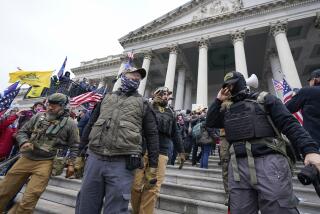He Had a Dream : Pioneer in North Carolina Civil Rights Movement to Be Honored
- Share via
LA HABRA — Ralph Johns vividly remembers the day 35 years ago when four black students staged a sit-in at a whites-only lunch counter at a Greensboro, N.C., Woolworth’s store.
For years he had been trying to persuade black students to commit such an act, recalled Johns, 79, a La Habra resident who then owned a clothing store in Greensboro, where he served as the first white vice president of the local chapter of the NAACP, organizing numerous demonstrations to promote human rights.
“Ever since 1948, I would ask students who came to my store if they had the courage to do a sit-in, and just before Christmas in 1959, Joe McNeil said, ‘Yeah,’ and he came back with three friends on the first of February” in 1960, Johns said.
“I brought them into my store and told them, ‘Here’s the money. I want you to go in there (Woolworth’s) and buy some things, make sure you get the receipts and then take a seat at the lunch counter and order some food.’
“ ‘When the waitress says, ‘We don’t serve your kind here,’ you call her a liar because you have the receipts to prove Woolworth’s serves Negroes at all the other counters and you want to be served at the lunch counter.’ ”
What happened next would become a lightning rod for the civil rights movement.
The four students from North Carolina Agriculture & Technical College--freshmen Joseph McNeil, Jibreel Khazan (formerly Ezell Blair Jr.), Franklin McCain and David Richmond--kept up the protest for five months. They were joined by thousands of others. Finally, on July 25, 1960, Woolworth’s and two other Greensboro department stores agreed to put an end to segregation.
For Johns, his participation in the sit-ins and his fight for the civil rights of African Americans earned him countless death threats and caused the breakup of his marriage.
Now, 35 years later, Johns and the others who participated in the Woolworth’s sit-in will be honored on the anniversary of that historic event.
“Ralph had been trying to get someone to do the sit-in for some time,” said Melvin (Skip) Alston, a Guilford County, N.C., commissioner and founder of Sit-In Movement Inc., which will present an “Unsung Hero” award to Johns next Wednesday in Greensboro. “He was instrumental in the movement that was replicated throughout the world.”
Khazan, one of the original sit-in demonstrators, praised Johns for his courage and his convictions.
“I believe Ralph is one of the greatest humanitarians that ever walked this earth,” he said. “He did not have to help us . . . but he came to our aid to back us up. . . . He was God’s messenger who blew the horn for freedom and he blew it loudly.
“Ralph has always been a larger-than-life person who should be honored,” Khazan added.
*
In addition to Johns, Sit-In Movement will honor Khazan; McCain; Richmond (who has died); McNeil; Khazan’s father, who gave the students moral support and encouraged them to stage the sit-in; Dr. George Simkins, the former president of the Greensboro’s NAACP who served in that post for 25 years; Rosa Parks, the woman who refused to give her bus seat to a white man in 1955, and J. Kenneth Lee, an NAACP attorney and the first African American to enter the University of North Carolina at Chapel Hill.
Johns, who ran away from home as a teen-ager and hitched rides on freight trains across the country, began his civil rights crusade 65 years ago. During one of his escapades, he met a black man on a train and struck up a conversation. Six white men forced him and the other man to jump off the moving train “because whites weren’t supposed to talk to Negroes,” he recalled.
Other similar incidents convinced Johns to stand up for equal rights for everyone, he said.
“I was sick of all the oppression,” he said, thumbing through a scrapbook containing editorials he wrote in the 1940s, ‘50s and ‘60s for a black-owned Greensboro newspaper denouncing racism, unfair treatment and poor housing conditions.
For decades, Johns said, he would go into slums and ghettos to tell residents to quit paying rent until their outhouses were removed and indoor plumbing was installed.
He also urged people to protest poor living conditions and demand higher wages at work.
*
Through the years, Johns provided college scholarships to help African American students. One of his scholarship recipients was Stonewall Jackson, the first African American to play professional football with the New York Giants.
He also gave the Rev. Jesse Jackson a job as a sales clerk in the 1950s when such jobs usually were denied to African Americans.
Johns moved to Southern California in 1970 and became a bit actor. He lives in a La Habra mobile home park with his second wife, Norma, and works as associate publisher of the Beverly Hills Courier.
Johns still cares for those who are less fortunate, spending his winters providing blankets to the homeless in Los Angeles County.
He keeps a number of scrapbooks and photographs documenting the civil rights struggle. “I just cry for the poor, the hurting and the oppressed, and my life is dedicated to helping them,” he said.
More to Read
Sign up for Essential California
The most important California stories and recommendations in your inbox every morning.
You may occasionally receive promotional content from the Los Angeles Times.













